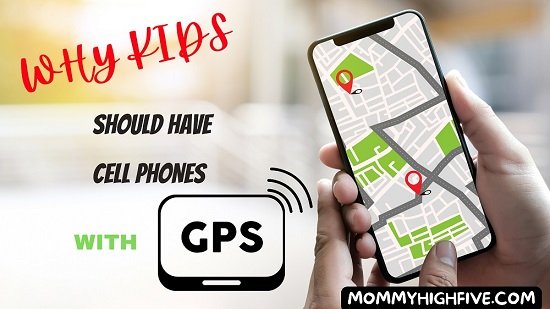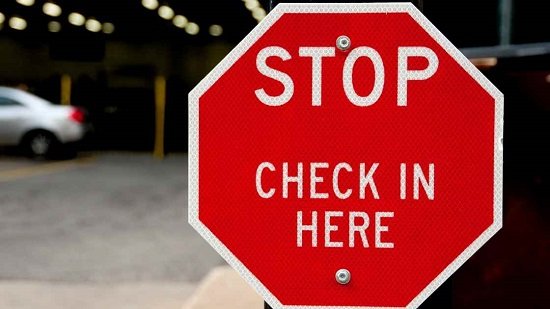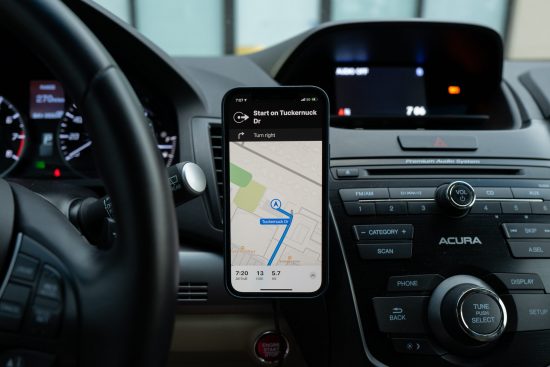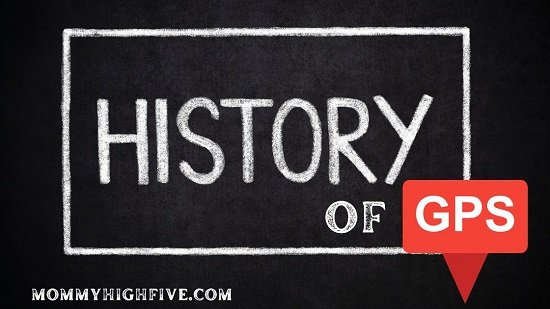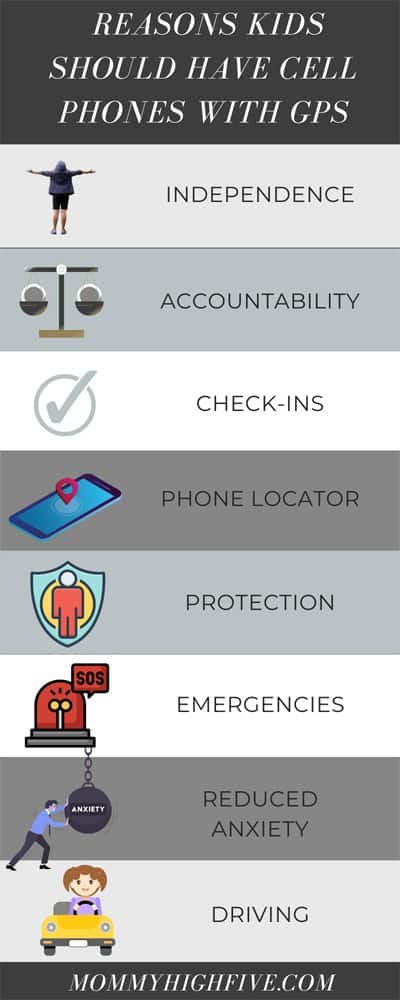Statistically speaking, most people rely on their smartphone for so many things like I do. In fact, According to the Pew Research Center, 85% of Americans own a smart phone.
Parents have been wondering for at least 15 years what age do kids need a cell phone and it seems like making that decision is getting more complicated. There are many things to consider and a number of pros and cons that go into making that decision; but at the end of the day, the parents know their individual child best and are therefore best qualified to make that decision.
Since studies show that one in three children have a smartphone by the age of 12, the decision that many of those parents are coming to is that the phone, and features like GPS-related apps, are right for their children. And for those who don’t want their child to have a smartphone, there are several kid-friendly phones without internet browsers that still have GPS. For younger kids, there are phone watches that have GPS as well.
Benefits of GPS in a Kid Cell Phone
While there are many factors considered by parents as they ponder the rationale for providing a phone with GPS to their child, here are eight that are commonly included.
Independence
Sadly, the days when kids could safely leave the house after breakfast and not be back until dinner are gone. But in spite of the modern-day risks out there, it’s still important that as kids grow they are given the opportunity to experience times of independence and a measure of freedom.
Having a phone (or watch) with GPS allows them to experience that independence as they hang out with friends away from mom and dad. At the same time, it enables parents to know where kids are and where to find them if things do go wrong.
Accountability
A GPS-enabled phone is something most kids want, so most will feel a sense of responsibility to not to drop it, submerge it in water, or lose it. They can also learn lessons of accountability in terms of data use, forbidden websites, and more like making sure it is charged.
And maybe most importantly for a parent, the child become responsible for keeping track of time and arriving home on schedule. All of this can be monitored by a watchful parent.
Check-ins
If GPS tracking is enabled on your child’s phone, you will be able to view their location and receive alerts when they get home, to a lesson, or to a friend’s house.
On many apps you can set up geofences, which are zones where you want to be notified when they are entered or left – school and home. This might be one of the most compelling reasons to get that phone for many parents; life is busy enough without having to always be wondering if they made it to their destination.
Lost Phone Locator
It happens to the best of us, so it’s even more likely to happen to a young person. I’m talking about the awful feeling of not being able to find your phone anywhere! I love the lost-phone locator feature, where another device can show you exactly where the phone is.
Protection
It is an unfortunate reality that we can’t protect our children like we did before they started school. I hate to hear of school shootings and abductions. Although I realize that we cannot control everyone that comes into contact with our children, maybe we can provide tools that can help in the event something does happen.
A GPS tracker would be helpful in knowing if a child is hiding in a closet at school and can help in locating him. If they are abducted, it can help determine their last location and even alert you when they don’t make it to their destination. Hopefully we won’t have to use it in this way, but isn’t it better to be safe than sorry?
Emergencies
It is always good to be prepared for the unexpected and if a natural disaster, fire, an emergency happens, or even if you just get separated from your kid at the mall, you can easily find out their location and get in touch with them if they have a GPS-enabled phone.
Reduced Anxiety
Kids like to know where their parents are and when they will be home, they just don’t always like to admit it. It can be just as reassuring for your child to check your location on their phone, as it is for you to know where they are.
Driving
Letting your 16-year-old take your car out can be a nerve-wracking experience of epic proportions, but with a GPS-enabled device in their possession you know where to find them in the event of getting lost or in a crash. And they will be able to get driving directions without the distraction of looking down at a map or stopping to ask for directions. Plus, they will not be able to use the excuse that the reason they are late is that they got lost ?
Other Reasons
There are many other times when you want to know your kid’s whereabouts: Are they missing school? Where are they spending their time? Did they make it to work? That phone of theirs can become your best friend as a parent in helping keeping you informed!
We use our phones for a lot of different purposes: photos, shopping, banking, music, news, and we can’t forget the really valuable GPS feature that has become almost indispensable. This last weekend I was so thankful for that voice telling me that to get to my destination I had to turn right in 500 feet.
I was in an unfamiliar city, didn’t know my way around, and needed to be somewhere at a specific time. But Siri came to my rescue! Without her and the GPS feature on my phone I would have spent a good deal of time lost and confused and would have missed a treasured family event.
I don’t remember how I found my way around before Siri – oh wait! I vaguely remember printing out instructions from MapQuest. … Looking back, that seems so dangerous! I had to be so distracted looking down at the instructions and back up to my driving. It’s amazing I didn’t get in an accident.
A lot of phones have a way to share the user’s location with other devices. On IOS devices like iPhones, it is “Find My Friends“. For Android users, or for those who have a mix of iPhones and Androids Google Maps have a free tracker. You will need to log into your Google account and turn on the location sharing.
I think these trackers are extremely handy in helping to be informed where my family is. The maps are detailed and show where everyone is on a map. Find My Friends will even notify me when my husband leaves work or when my son gets home – extremely convenient when I am getting dinner ready.
Other kid-friendly devices with GPS
Not ready to have your child have a phone but still want to be able to track them? There are several GPS trackers on the market – here are a few:
Smart tag trackers
These trackers can easily be clipped to an article of clothing or backpack, placed inside a pocket or bag, or attached to a shoe. Some have buttons that can be pressed in an emergency that can alert you to a problem. Several devices will alert you if the device leaves or enters a designated area (these are called geofences) – so you will be alerted when your kid gets to school or home. There is also a button that will send its current location in case of an emergency. Most devices of this type need to be charged about once a week and require a monthly subscription.
Phone watches
There are a number of smartwatches that offer GPS tracking. A smartwatch will allow calls and texts from a few specific numbers so you have a lot of control who is able to contact your child. On most phone watches you can set a safety zone (geofence) and it will notify you if your kid leaves it. You can also be notified when he gets to a designated place. It also has a monthly subscription.
Tracking Apps
There are a number of apps available to help you track your child. Here are a few great apps to check out:
Life360: For an app that the whole family can use, look no further. Life360 tracks location and can send you place alerts to let you know when your family member is arriving at or leaving a specific place (school, work, home, etc.). It also has drive notifications which can tell you how long someone has been driving and what their speed is. For a parent of teen drivers, that’s a great feature!
EyeZy: This app has everything you need to keep your child safe. Besides showing their location, it has a panic button that will alert you if he feels threatened or needs help. You can be notified when he enters or leaves a geofence area. It allows you not only to see what apps he has installed, but you can also block ones you don’t want him to have access to. You can see who his contacts are and check out his search history on the internet.
Famisafe: This is an app that does it all – from location to geofences to managing content to blocking inappropriate pictures and even a driving record for older kids.
Google Family Link: This is great at helping keep all of your family and their devices safe and will help guard against unwanted content on both Androids and iOS devices. This doesn’t have a location tracker but will work with the Google Map tracking.
iSharing: This is also a great app for a family. It will allow you to be alerted when your kid gets home, to school, to practice, or wherever else they need to be. You can check on your teen’s driving habits and all the places they have been. It has a panic button that can alert in and emergency. A unique feature this one has it the ability to access the street view of where he is.
Find My Kids: Like most of the other location tracker apps, this one lets you see the history of places your child has been, receive SOS alerts, and notify you when she gets somewhere. What is unique about this one is that it allows you to listen in to what is happening when your call or text goes unanswered.
A few words of caution: just as you are able to track your loved ones, apps can track you and your child. Last year Apple introduced their App Tracking Transparency feature which allows you to control who is tracking your device. Google followed with its version for an Android. Both of these help, but please be aware that the danger is still there.
Sadly we need to be careful with what we share with these apps and especially what our children share. Also, if your kid doesn’t want you to know where they are he will also be able to turn off his location – and believe me, he will know how to do so! So be sure to be prepared for that possibility.
While we are talking about caution, let me add my two cents about the importance of having an open, honest conversation with your child before you start to track him. A lot of this conversation will depend on the age of your children. If they are under 10, they are more likely to accept the tracking without questioning the reason. In fact, they most likely will be more excited that they are getting a little more freedom.
But if you are wanting to start tracking your 16-year-old, that’s a different conversation. Sometimes it might be a consequence from prior decisions on their part and perhaps they need to earn your trust back. Most likely, it is because you love them and want to keep them safe.
When they understand that you are not trying to control every aspect of their life, that you trust them, and will only be checking on their location when you have a concern, they are more likely to accept it. And if the conversation goes well, they might even appreciate that you’re silently watching in the background and not calling or texting all the time to check in on them!
Tracking your children with a GPS-enabled device can be a good way to keep them safe, build independence and trust, and help them transition into the responsibility of adulthood. It will be good to remember that as your child makes that transition, you will also transition from overseeing everything, to some things . . . to very little. Isn’t the goal, after all, to raise a healthy, independent adult?
How GPS Came to Be
So how did Siri or whoever it is on your phone come to be? How did GPS become so commonplace in our lives?
The technology that would eventually change our lives got its start in 1957 when the Soviet Union launched Sputnik (a satellite) into space. Scientists in the U.S. soon learned that they could pinpoint the exact location of Sputnik as it circled the earth. As they discovered, the frequency of radio signals from Sputnik changed depending on its location. This is known as the Doppler Effect. This breakthrough in understanding was the beginning of what we know now as the Global Positioning System (GPS). Over the next few decades the U.S. launched various satellites to enable GPS technology and we now have a network of 24 orbiting the earth.
The military used this new technology to track submarines transporting nuclear missiles. In order to maintain secrecy, the signals were scrambled until 2000. That was when President Bill Clinton issued an order to stop the scrambling so that civilians could benefit from the technology that NASA and the military had been using for years.
It took less than 10 years for Apple and Samsung to add a navigation feature to their cell phones. I recently learned that all cell phones that are sold in North America have the capability to tell 911 where the device is located – thank you GPS! Most phones come with some kind of GPS tracking system that can be shared to other devices as well. We use our phones not only to help us navigate a road trip, but to find the nearest grocery store. And we can’t underestimate the value of Siri knowing how long it will take to get there, the fastest route, and traffic conditions.
